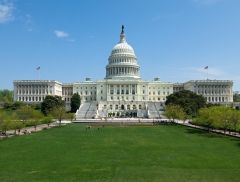 Jan Schakowsky and U.S. Sens. Sherrod Brown and John McCain introduced H.R. 5573; the Price Relief, Innovation and Competition for Essential Drugs (PRICED) Act. As reported on congress.gov, the bill would “amend the Public Health Service Act to shorten the exclusivity period for brand name biological products from 12 to 7 years.” (The full text has not yet been uploaded.) This would allow generic firms to enter the market sooner, pulling down prices through competition.
Jan Schakowsky and U.S. Sens. Sherrod Brown and John McCain introduced H.R. 5573; the Price Relief, Innovation and Competition for Essential Drugs (PRICED) Act. As reported on congress.gov, the bill would “amend the Public Health Service Act to shorten the exclusivity period for brand name biological products from 12 to 7 years.” (The full text has not yet been uploaded.) This would allow generic firms to enter the market sooner, pulling down prices through competition.
A press release by Rep. Schakowsky notes that the legislation has been endorsed by a number of large civil society groups, including AARP, and the AFL-CIO. It also lists Rep. Jim McDermott (D-WA), Rep. Elijah Cummings (D-MD), Rep. Lloyd Doggett (D-TX), Rep. Peter Welch (D-VT), Rep. Rosa DeLauro (D-CT), and Rep. Marcy Kaptur (D-OH) as co-sponsors in the House.
Here are the statements from those who introduced the bill:
Schakowsky
Across the country the American people are struggling to deal with astronomical prescription drug costs for life-saving medicines. Nowhere are those costs more excessive than for biologic drugs. These drugs already come to market at very high prices, yet the manufacturers often increase the prices every year. In fact, Gleevec, that is used to treat cancer, came to market at a cost of $26,400 in 2001, but today it has an annual price tag of $120,000. This is simply outrageous. Today, I’m proud to stand with Senator Brown to introduce legislation that would increase competition in the drug market and lower prices. By reducing the period of exclusivity from twelve years to seven, we can increase competition by allowing for the development of generic versions of these expensive drugs. According to the Department of Health and Human Services, reducing the period of exclusivity would save taxpayers nearly $7 billion over the next ten years, and the Medicare Trustees report showed that we could save Medicare significant amounts of money by lowering drug costs. We must act to help provide relief for millions of Americans who are struggling to cope with these excessive costs.
Brown
The high cost of prescription drugs hurts patients, strains Medicare and Medicaid, and drives up private insurance costs. Among the most expensive prescription drugs, biologics can be effective in treating cancer and other illnesses, but are often too expensive. The PRICED Act will allow for more robust competition in the biologics market and provide for more new, equally effective biosimilars which will help provide more options for consumers and drive down prices. This will save taxpayers billions of dollars while incentivizing innovation that could save lives.
McCain:
Far too many Americans are being unfairly burdened by the skyrocketing costs of prescription drugs. It’s simply unacceptable that patients have to worry about filling a prescription because they can’t afford to pay for it. The PRICE Act would inject much-needed competition in the biologics market, bring down costs for live-saving drugs, and save billions in taxpayer dollars.
Public Citizen has put out a press release supporting the bill, in which Access to Medicine Program Director Peter Maybarduk gives the following statement:
Big pharma is holding Americans hostage, with prices for lifesaving medicines running in the tens and hundreds of thousands per person. The inevitable result is rationing of treatment by payers, prescriptions left unfilled and pills split in half. This bill responds to consumer demands that our elected officials take real action to rein in monopoly abuses and make medicines affordable.
The Biotechnology Industry Organization issued a statement opposing the legislation, warning that
This legislation would disrupt the careful balance, created by Congress with broad, bipartisan support in the Biologics Price Competition and Innovation Act (BPCIA), between the need to encourage investment in innovative, groundbreaking biological therapies and the desire to ensure that patients have increased choices offered by biosimilar products after a reasonable period of exclusivity for the innovator product. Data exclusivity of 12 years is an essential incentive for the huge risks associated with biotechnology investment.




